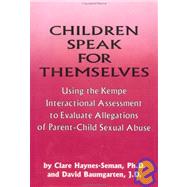Children Speak For Themselves: Using The Kempe Interactional Assessment To Evaluate Allegations Of Parent- child sexual abuse
, by Haynes-Seman,Clare- ISBN: 9780876307458 | 0876307454
- Cover: Hardcover
- Copyright: 11/1/1994
Mental health and legal professionals struggle daily with complex challenges presented by allegations that a parent has sexually abused a child. The majority of these cases involve children who cannot or will not verbally disclose the abuse. This pioneering volume describes a technique that has proven highly effective for evaluation and clarification in such difficult, emotionally laden cases of child sexual abuse. This technique, the Kempe Interactional Assessment for Parent-Child Sexual Abuse, facilitates the emergence of reliable data without the pressure of directly questioning the child. Children Speak for Themselves About Sexual Abuse examines the history, rationale, protocol, and theoretical bases for Interactional Assessment and describes in detail the skills that are required and tasks that must be completed by the clinician in order to use International Assessment accurately and effectively. Firmly rooted in attachment theory, Interactional Assessment is based on the fact that even preverbal andnonverbal children do "speak" for themselves about experiences with important people in their lives. By accurately recognizing, understanding, and translating children's communication, this method makes available for clinical and legal professionals crucial, firsthand information that might otherwise be ignored. In this book, you'll learn how Interactional Assessment is comprised of three parts: a clinical interview with each parent in the presence of the child, videotaped observations of parent-child interactions, and an individual play interview with the child. Children Speak for Themselves About Sexual Abuse presents highly detailed case illustrations that demonstrate the various ways that children communicate their experiences of sexual abuse and provide insight into how sexually abusing relationships develop and are maintained within a family system. These case studies also clearly illustrate the value of Interactional Assessment where other techniques may not be effective particularly when allegationsinvolve young children, children caught up in an acrimonious divorce, or when the "outcry" is filtered through untreated survivors. The volume also examines how Interactional Assessment can provide crucial clinical data about the qualities and dynamics of a family relationship that can reliably distinguish between sexually and non-sexually abusive relationships. Finally, the book addresses evidentiary and practical considerations for court presentations of utmost importance since professionals must not only offer evidence that is clinically reliable, but must be prepared to meet and withstand the rigors of increasingly adversarial legal proceedings. This volume will provide clinicians, attorneys, and other professionals involved in decision-making with a reliable clinical procedure that can not only easily reveal available data but can also help to uncover more covert information and verify whether abuse has occurred and by whom.







